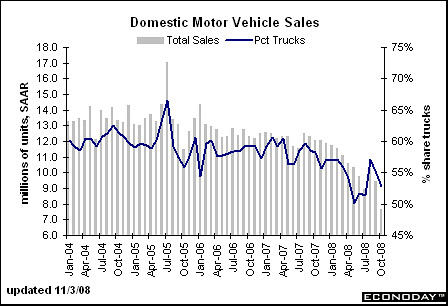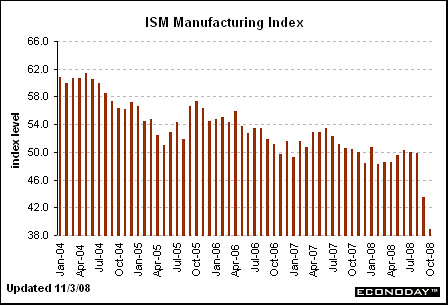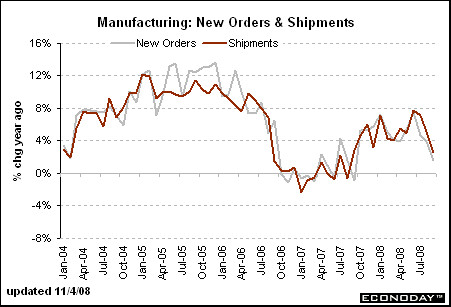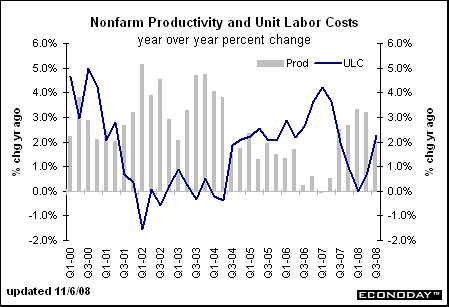Welcome, ladies and gentlemen, to another installment of Manufacturing Monday. Today we are going to cover something that has been in the news lately, General Motors. Well to be exact, the potential bankruptcy of GM, and what it could mean to you. For many, this is a non-issue, who cares about another car company and a failing one at that? But indeed, it may just be that a collapse of GM could be worse than that of Lehman Brothers and AIG. Of course we'll cover, as always, the economic indicators for the past week and what they also mean. So without further adieu, the Numbers!
The Numbers
Last week began with two very high impact numbers, domestic auto sales and the Institute for Supply Management (ISM) Manufacturing Survey. The former showcased the current retail situation of cars made in the United States, this includes both American and foreign brands. Like much of the rest of the economy, sales of new cars are also in a tailspin. One of the factors that aided in the downfall in car sales was the credit crunch, where many dealerships simply could not hand out loans for purchasers of autos. The figures, representing October, came in at below expectations. The previous month of September had shown 9.4 million cars sold. Consensus was between 8.4 to 9.3 million cars sold for the report. The latest figure came in at 7.7 million cars sold, an 18% drop from the previous month.
Also on Monday we received the latest ISM Manufacturing Survey. To no one's surprise, this also showed an economy in decline for October. The Survey, which follows the sentiment of 300 manufacturing firms, came in at 38.9, well within the consensus of between 37.8 and 48.5. The previous figure, for September, was at 43.5. Any reading below 50 indicates a contraction in the sector.
Tuesday we saw another major indicator, Factory Orders, essentially confirm the previous industrial numbers. Factory Orders, which are new orders for durable and non-durable goods made here, is one of those indicators that lags for two months. The figures released last Tuesday represent activity for September, so just think of it as a confirmation. For that month, orders dropped 2.5%.
We now hit on the release of two economic indicators that are critical to manufacturing, Productivity and Unit Labor Costs. For those new to this column, the Productivity indicator is a measure of efficiency. For businesses, a positive percentage number essentially means you're getting more out of your workers. Now the next indicator that is released with Productivity is Labor Costs which reflects the total costs of workers on the job. A positive number in that last one is often regarded as inflationary.
Both figures represent a quarter of the year, and at the risk of confusing you, they often re-release the numbers a month later with revisions. Well the latest figures shows Productivity still growing, albeit at a slower pace, now at 1.1% from the previous 4.3%. Now don't go thinking that workers got lazy or anything, the drop basically shows instead that the workforce is facing less demands for work. Now what's a tad more of a concern, is the rise in Labor Costs, given the current economic conditions. Let's be honest here, if the economy is slowing the last thing a shop owner or plant manager needs is rising costs, as this eventually leads to "labor saving costs" (which I know you know what that means!). For the third quarter, Unit Labor Costs rose from a minus half a percent to a 3.6%!
Much Ado about General Motors (Part 1 of 3)
"because for years I thought what was good for the country was good for General Motors and vice versa".
Charles Erwin Wilson, President of GM, before the Senate Armed Services committee, 1953.
Never has a positively-inclined quote had such an ominous meaning. Today's General Motors is most definitely not the same auto titan of the 1950s. If Mr. Charles Erwin Wilson were alive today, he probably would be aghast as to how his firm, which once commanded a dominant market share of the world auto market, shrink to the point of near oblivion. Where once they had reached a point were more employed by them than many governments, they are now shedding jobs at an ever increasing velocity. And today, an analyst at one of the major financial firms has now stated that the shares are essentially worthless. General Motors, to give you an idea of how far it has fallen, once traded less than a decade ago at a high of $100 per share, now trades at less than $3.35.
So now the unthinkable is now asked....what is General Motors does declare bankruptcy? The answer to that question at this point is not as clear cut as many would believe. What we do know is that jobs would be lost, and that the tax payer would be set with an enormous bill. The fate of GM has also served as an ideological battleground of sorts, the largest combatants being those who wish to see the firm die out and those who wish to see it re-capitalized.
The ideological war over the fate of GM
Watching CNBC and reading the Wall Street Journal or magazines like Forbes, the general message is to let General Motors die. Ironically, these folks have company with those who in general are their political opposites. Many on the left have called for GM to “die” as well. The differences between the two are their reasoning's. This “political battle,” if one can call that, has also seen the entrance of a geographical dimension.
I will say, witnessing the debates between these various camps, I have not seen such passion (or vitriol) on such a subject since perhaps that of abortion/choice. You have, for example, the Free-marketeers or Kudlowites (as I like to call them); these are your followers of Ann Rand and Milton Friedman. Their basic argument is that the market has deemed General Motors a failure and should be dispensed with. The twist in their argument, and this is where really a conservative overtone is layered onto their economic libertarianism, is that their prima facie were the labor contracts. That the unions served as an anchor tying down the company, and ultimately serving as a liability that only grew with time. Go ahead and look at all the videos you see on CNBC's website were they discuss this, it always goes back to the United Auto Workers. They also contend that forcing them to make fuel efficient cars was unprofitable because...well you guessed it, legacy costs and labor deals. The more conservative elements in this camp also go on about CAFE standards and how they need to be less restrictive or eliminated for any chance at future profitability.
The other side that has been most vocal, have been those who argued that General Motors did not produce cars that the market wanted. This is similar to the Kudlowites' argument, except that their prime focus has been on the environmental aspect. That is that General Motors failed to meet a demand for fuel efficient automobiles, and because of their neglect, foreign competition at their lunch. GM had put all their eggs in one basket, a product that was one of the most environmentally unhealthy , the Sports Utility Vehicle ( or SUV for short). Because of this, some environmentalists have contended, that the corporation should be “punished” with bankruptcy.
As stated earlier, there is now also a geographical dynamic to this saga. The past twenty-plus years, as the fortunes of American automobile companies were in decline, so where the states that mainly served home to their production lines. Though it could easily said that these were northern states, in reality, GM's production facilities span much of the United States. Yet the perception has been, where the UAW is strong, that is where General Motors has a location. Now, on the other side of all this have been a coalition of sorts.
Whereas states like Michigan and Ohio have seen their fortunes follow that of Ford or Chrysler, southern Republican-dominated states like Alabama and Mississippi have seen theirs go up with that of Toyota and Honda. Indeed, its almost like having a North-South conflict all over again, only the weapons this time are incentives and the casualties are jobs. While Japanese and European auto makers have, in fact, opened up facilities in places like Ohio, the bulk of the expansion has been in the Southeastern United States. There, as representatives of these states ranging from business journalists to governors, have touted without hesitation on the fact that labor costs in their states are lower. Many on television or radio have taken pride in acknowledging that they are a “non-union” state. Sometimes I think when they say that, they mean our American Union versus that of the United Auto Workers. Either way, they seem to delight in pointing out that they are winning in the competition for jobs against their blue-state siblings. They've become, in a sense, an ally of sorts to the first faction mentioned, the Kudlowites. Where the two have come to lock horns though, is that these states have put forth that salvation for GM would come by moving to their region. Bankruptcy, well it's only support, would be if General Motors constituted a new corporate chart in say Alabama.
Of course GM deserves the blame!
Oddly enough, all three sides have a point. GM had decades to meet the demands of the consumer. The company knew very well that the history of the auto industry were ladled with peaks and valleys, foresight should have been paramount. Foreign competition was not exactly a new phenomenon, why GM is still paying the price for not reacting to the Japanese 30 years ago is testimony to the incompetence of management.
The market demanded fuel efficient cars, even when petroleum had reached a low of $15/barrel, consumers were still getting more for their gas dollars with a foreign model. But to say that General Motors did not know how to build such a car would not be true. Across the globe, the corporation met those markets' fuel standards. Yet when it came to the United States, GM, along with the other two, moved in the opposite direction. Indeed, they even poured resources into stopping such initiates as CAFE.
The sickening thing is, that when we critique General Motors, the other two acted in concert to such a high degree, that really this is an indictment on the management of the entire US auto industry. When they did start to recover from the initial Japanese automobile tsunami, in the early 90s, they instead decided to ignore what they learned and opted for a different product line. Small cars didn't seem as a great prospect when it viewed the success of Chrysler's mini-van. In addition to this, they also fought Ford in the truck lines. Ignoring the possibilities of higher fuel prices, GM and others opted for the SUV. For a long while, it looked like a winning decision, virtually everyone was purchasing a Sport Utility Vehicle, and investors goosed up auto stocks to heights not seen in a long time.
But slowly, the realization of fuel efficiency was rearing it's head once more to Detroit. Those with an environmental inclination were screaming for Detroit to come up with a “green solution.” Grand promises were made about the future of electric cars, at times one were lead to think that just around the corner such a solution would be at hand. Time after time, at the Chicago Auto Show, I remembered past executives touting this or that. Yet it was all for show...literally in that case! The closest General Motors came to an environmental solution was the EV-1. Yet this too was a half ass attempt that was fraught with problems, problems that were largely the fault of management who went forward with this like the Bush Administration did with Iraq (though with less dire consequences). In the end, GM, which had an electric car in the mid-90s, dropped the ball and focused it's attention towards the day's money markers, the SUV. The electric automobile abandoned, GM would later lose the lead to it's Japanese rival, Toyota who would come out with the Prius a decade after the EV-1.
Yet what about the argument about the legacy costs of the labor contracts? Do union officials share the blame in the demise of General Motors? One could easily point to things like the infamous Job Bank, or even stipulations in contracts like smoking on the assembly line. Wages for UAW membered employees are almost double that of the non-unionized auto workers found in Japanese plants. There is also the health care costs and other things. Much of the supposed largess was negotiated when times were better for the automakers. But, labor unions simply exist to protect the livelihoods of it's members. The UAW simply responded to the economics of the time, and of course the social-economic infrastructure in which it operates. Labor costs were higher because this reflected the system in which it's members operated in. This isn't to say that the UAW could have made more concessions, but the question became where?
In comparison to say the Canadian Auto Workers (CAW), the UAW has to negotiate health benefits because there is no government solution. We live in a nation that does not provide a standard universal health care system. Secondly, in regards to pensions, the US government provides a pension system that today barely meets the needs of retirees. The membership of the UAW knows that Social Security is inadequate, and thus have to work from that point on forward. Perhaps instead the unions should have opted earlier on in taking over the pension system away from GM. Once more, take all this and realize that in it's current state, this nation does not have an adequate safety net for those still working. The automobile industry, along with the UAW and other affiliated unions, should have pressed harder decades ago on establishing a stronger system. But this did not come to be, and perhaps in the future we will have something better.
The arguments put forth by the conservative southern states ring more of opportunism than anything else. They still fail to see the longer term picture, industrial work requires organized labor, this is not something more market-inclined folks like to hear. While the present situation promoted by these states provides flexibility, the longer term costs could be more dear. Tax cuts and other similar incentives do not come cheap. Down the road, there is nothing to stop Toyota or Honda from dealing with the economic forces of nature. The Japanese will soon face a competitor across the Sea of Japan that has learned from them, and who can compete on a much lower cost. There is nothing stopping Toyota or what have you from closing up shot in Alabama and re-opening up in Guangzhou. Then what will be done with all those workers who are now without a job and health insurance or funded 401k?
Tomorrow I will go into Part 2, the possible ramifications of a Chapter 11 filing by GM.






Comments
Jim Cramer on GM
and I hope we get a youtube of this because I was standing up saying right on Jim!.
Mad Money 11-10-08:
What is so important about this is a very entertaining stock picker guy who periodically goes ballistic on the Fed nails it. He gets that in the United States what we really have is trickle up consequences and if they continue to piss on manufacturing and the working/middle class, eventually that shit rolls upward and is going to hit Wall Street and the super rich where they live.
I usually watch Cramer for the entertainment value but today he said sacriledge to Wall Street, that working America will effect them badly...talk about truth to power.
He's about spot on. The
He's about spot on.
The number I'm coming to, if you include even the ancillary industries, the dealerships, municipal jobs related to the industry, and so on....well we're talking about 5-6 million jobs. And that's being conservative, because the negative effect on the economy would actually be greater.
A preview of sorts....consider this, that tomorrow morning or the day after, GM declares it will go into Chapter 11. It could force the shut down of half it's production literally overnight. The UAW really would not have a say in this, as the company would be in receivership. All or a good chunk of the contracts to suppliers would be null and void. This would send a shock to their industries, which would lead to furhter closures and layoffs. These industries have suppliers as well, so they would go next.
Then you have the dealerships, some of whom have only one company-branded product line (say only Chevy and Buick). They are immediatly left scrambling to look for a new supplier of autos and financing. Some would be able to pull it off, many won't, not in this economic climate.
I've got two answers to that
To replace those 15 million jobs.
The first: If GM goes down, nationalize it to make all the same car & truck bodies it does now, but with small 4 cylinder generators and electric drive trains. If this guy's project is any indication, that small change in technology can result in 400% efficiency over the old tech.
The second: A Manhattan project to add solar, wind, geothermal, and deep water systems, based on location, to every building in the United States, with an aim to generating enough ambient energy on-site to have energy usage from the grid net zero, effectively using the grid as a giant battery.
Between the switchover in tech in old auto plants, and the massive rennovation, you can create 15 million jobs overnight. They won't be long lasting jobs- two to five years max and we'll run out of this sort of work- but they will be wealth-generating jobs.
-------------------------------------
Maximum jobs, not maximum profits.
The Bluepring for total...yes Virginia, Total US energy...
.....independence is:
Right Here!
Yet, I never hear Obama or anyone else ever mention it....
I wonders why not?
'When you see a rattlesnake poised to strike, you do not wait until he has struck to crush him.'
One problem I see with relying on the SW desert
Is the same problem we're running into elsewhere- too many eggs in a single basket, relying on long distance shipping/transmission to get stuff done, rather than local production for local consumers.
Having said that though, it's certainly an important part of the picture- especially given the overpopulated cities that ring that desert.
-------------------------------------
Maximum jobs, not maximum profits.
That is the plan...
They will merge autos and energy independence.
They're asking for another four years -- in a just world, they'd get 10 to 20 ~~ Dennis Kucinich
Cramer :wants a Sovereign Wealth Fund for the U.S.
But before the Cramer SWF (he is from Goldman), or my idea of the Enterprise Fund. We should condsider what J. Venom says re Health & Penson
"
In comparison to say the Canadian Auto Workers (CAW), the UAW has to negotiate health benefits because there is no government solution. We live in a nation that does not provide a standard universal health care system. Secondly, in regards to pensions, the US government provides a pension system that today barely meets the needs of retirees. The membership of the UAW knows that Social Security is inadequate, and thus have to work from that point on forward. Perhaps instead the unions should have opted earlier on in taking over the pension system away from GM.
"
This is very true, in fact Toyota at one time manufactured the RAV4 in Mississippi but moved production to Canada, not because of the education, skills or the rest of the crap the reactionaries spout against U.S. labor, but due to the Canadian Health Care system!
Burton Leed
20%
That's what I've read is the average cost savings by moving jobs to Canada and Ireland simply due to health care costs.
Letting campaigns and corporate lobbyists immediately dismiss universal single payer was dumb.
If someone wants to write a post on the overall savings of universal single payer I think it fits this site.
I've put up many graphs showing the United States pays far more in health care costs than anywhere else in the world on top of it.
I think we're at the bottom in terms of health care quality.
Legacy and health care costs
Both the UAW and corporate management have eyed on the two largest financial burdens. Health care costs for its current and retired employees (you know beyond Medicare), and the pensions. Now they say the latter is fine, I'm calling bullshit on that. You can tell me they got the cash, but they also said they would turn the business around, so they aren't all that great in the credibility department. Unless you can get some sort of national health care plan in place within the next year, the UAW is going to have to realize that they will be in the health insurance business. If GM declares bankruptcy, all bets are off on any loyalty to the grand bargain they struck with the union; I suspect the UAW knows this as well.
the thing that I was to focus on
with health care is costs. The US costs are a skyrocket graph in comparison to every other nation on Earth, with now inferior care.
Something is very wrong with that picture even in comparison to private insurance countries like Switzerland, it's not even just the true universal single payer systems.
Demutualization
remember that until the early 1990's most health insurance companies were mutual firms, meaning that they were owned by policy holders, not Wall Street.
During the 1990s, these insurance companies were changed from mutual companies, to conventional stockholder firms so that they could seek out private cash. It created really fucked up incentives.
Like letting you customers die, because it made economic sense for the new owners.
Remutualization is rarely discussed as an option, but maybe this should be on the table.
Got a link for that 20%?
I'd love to put it in my slashdot journal- free market costs 20% extra.
-------------------------------------
Maximum jobs, not maximum profits.
I don't
I've just heard this said from some CEOs and a couple of Senators, so we need to research it out.
A US soveriegn wealth fund?
Not a bad idea on paper, at first. It would be nice but at the moment impossible. This was doable when we ran budget surpluses and paying down the debt. We can't even fund and operate Social Security correctly, let alone a government-owned equity firm!
incompetence
This is where I believe the "get government out of our lives, low taxes" conservative Populism is coming from. When you see the incompetence of management going on in government, the waste and the corruption, who can blame anyone for not wanting to hand over more money to them?
I seriously get this attitude.
How about that one as a campaign issue. We have professional campaigners and corporate fund raisers running our government when we really need competent managers, administrators and usually those two personalities don't go together.
We also have way too many lawyers in government. When they refer to a shortage in math and science skills, I always think of Congress itself. It would be damn useful if they could add two numbers together.